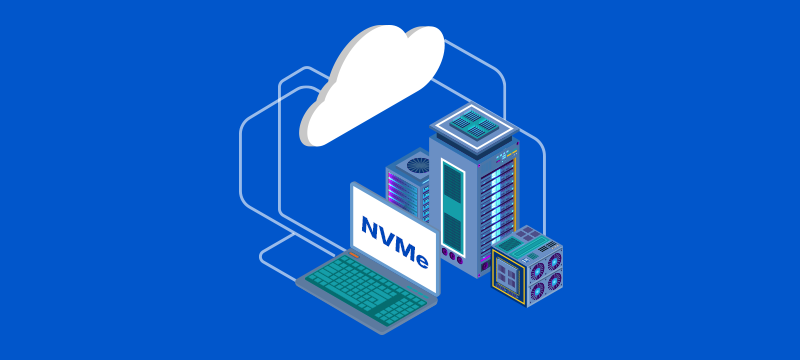For quicker and more reliable hosting, NVMe SSDs are currently the industry standard. Data centers have been using NVMe since 2017 to satisfy modern performance requirements. Early restrictions on platforms such as VMware ESXi gave rise to hybrid solutions like H-NVMe, which included enhanced modes for improved speed and isolation, making them perfect for enterprise use with high demand.
This guide will walk you through the importance of NVMe web hosting and highlight the top reasons why it’s a game-changer for websites in 2025.
What is NVMe Web Hosting?
Non-Volatile Memory Express web hosting is the term for web hosting services that use NVMe SSDs, which have read/write speeds that are noticeably quicker than those of traditional SSDs and HDDs. Since NVMe is built to take advantage of fast PCIe interfaces, it is ideal for companies that want great performance, dependability, and efficiency by 2025. By improving website speed, usability, and scalability, NVMe web hosting gives your company a competitive advantage in the digital market.

Types of NVMe Web Hosting
NVMe technology is integrated into various hosting plans, offering enhanced speed and performance across all hosting types. Here’s a quick overview:
- Shared Hosting: NVMe shared hosting is ideal for small websites; it allows multiple users to share server resources. With NVMe drives, page load times are meaningfully faster than traditional HDD-based shared web hosting, improving overall site performance even on a budget. bodHOST is one of the affordable options as they use advanced caching technologies and powerful servers to guarantee fast website speed for their shared hosting users with 24/7 support.
- WordPress Hosting: WordPress hosting, which is specifically designed for WordPress websites, ensures improved site performance, faster data access even with complicated themes and heavy traffic, better user experience, making it ideal for bloggers, businesses, and anyone seeking a high-speed website. Though it is more expensive than traditional hosting, but surely packed with more advanced technology.
- VPS Hosting: NVMe VPS hosting uses ultra-fast NVMe SSDs to deliver superior speed, performance, and reliability, offering a powerful, scalable, and cost-effective solution for websites and applications. It offers virtual private server space with dedicated resources, ensuring faster data access and reduced latency for businesses needing more control and speed than shared hosting.
- Dedicated Servers: With NVMe-powered dedicated servers, users gain full control over hardware along with unmatched speed, making them ideal for high-traffic websites, large applications, or databases that require constant high-performance data processing and minimal downtime. bodHOST’s NVMe dedicated server hosting delivers fast, reliable, and customizable hosting with rapid data access, complete resource control, 99.9% uptime, and 24/7 expert support, perfect for data-intensive workloads.
NVMe Web Server Components
NVMe-based web servers combine high-speed storage, efficient processing, and smart software to deliver faster performance, lower latency, and greater reliability for modern websites and applications.
Let us explore them one by one:
- NVMe SSDs: NVMe SSDs use a modern protocol that allows PCIe interface-based direct communication with the CPU. Comparing this to conventional SATA SSDs or hard drives, the read/write rates, latency, and IOPS are considerably higher. A better user experience overall, faster website loading times, and more flexible application behavior are all results of these speed improvements. NVMe SSDs are particularly well-suited for data-intensive applications that require fast data processing, expanding businesses, and websites with significant traffic volumes.
- PCIe Interface: NVMe SSDs are directly connected to the CPU with the PCIe (Peripheral Component Interconnect Express) interface, a fast communication channel. PCIe removes obstacles and allows data to travel between storage and the processor far more quickly than with earlier interfaces like SATA. For websites and applications that need to respond in real time and work constantly, this greatly improves data transfer speed and reduces latency.
- CPU and Memory: The central processing unit, or CPU, manages data requests, runs programs, and works with storage to carry out the server’s main computing functions. To enable faster retrieval and decrease the load on storage systems, memory, also known as RAM, temporarily stores frequently accessed data along with the CPU. A strong CPU and lots of RAM work together to enable the server to manage several tasks effectively, which improves speed and reduces user response times.
- Server Operating System: The operating system provides the framework for performing web services and regulates all server hardware and software resources. It is necessary to maintain system performance, stability, and connectivity among various server applications. Common server operating system options include Windows Server, which is preferred for enterprise or NET-based contexts, and Linux variants like Ubuntu or CentOS, which are popular for their reliability and adaptability.
- Web Server Software: Incoming HTTP requests must be handled by web server software, which also processes them and sends the appropriate web content to the user’s browser. This program makes sure that websites load quickly and correctly. Popular choices include LiteSpeed, which provides built-in caching and great efficiency under strong traffic loads; Nginx, which is commended for its speed and lightweight performance; and Apache, which is well known for its broad configurability.
- Additional Components: Caching systems, firewalls, and backup solutions are examples of additional features that are frequently combined to further improve server speed and reliability. Static content is stored by caching techniques like LiteSpeed Cache to reduce server stress and load times. By protecting the server from breaches and online dangers, firewalls provide an extra layer of protection. Backup systems are crucial for safeguarding data because they ensure important data can be quickly restored in the event of a system failure or data loss.
NVMe vs SSD vs HDD web hosting:
| Feature | NVMe SSD | SATA SSD | HDD (Hard Disk Drive) |
| Interface | PCIe (Peripheral Component Interconnect Express) | SATA (Serial ATA) | SATA |
| Speed | Very high (up to 3500+ MB/s) | Moderate (up to 550 MB/s) | Slow (up to 150 MB/s) |
| Latency | Very low | Moderate | High |
| Performance | Excellent: best for high-traffic or data-intensive sites | Good: suitable for most general websites | Poor: not ideal for modern hosting |
| Reliability | Very reliable | Reliable | Less reliable |
| Cost | Highest | Moderate | Lowest |
| Best Use Cases | Enterprise hosting, large apps, eCommerce | Blogs, small business sites | Backup storage, archives |
Benefits of NVMe hosting for websites:
- Higher Website Performance: NVMe drives drastically reduce page load times by enabling much faster data transfer speeds, resulting in improved website responsiveness and smoother browsing experiences, even during high traffic or resource-intensive processes.
- Improved User Experience: Faster website performance leads to improved user engagement by reducing wait periods, lowering bounce rates, and increasing visitor satisfaction, which in turn helps improve customer holding and boost overall conversion rates.
- Improved Website Consistency: NVMe storage is more robust and unaffected to mechanical failure compared to traditional HDDs, safeguarding reliable uptime, minimizing downtime risks, and providing a stable and trustworthy hosting environment for your website.
- Scalable and Cost-Effective: NVMe hosting solutions are a cost-effective option for growth because they provide flexible scalability, enabling companies to easily increase resources as traffic grows while maintaining good performance and avoiding a large increase in hosting expenses.
- Secure Data Storage: NVMe hosting enhances overall data security by offering a secure storage environment that protects important company data from fraud, loss, or illegal access with smart error correction and strong data security features.
Does NVMe Hosting Make Sense?
By 2025, businesses looking for speed, dependability, and scalability will find that secure NVMe cloud storage is a great option. By providing lightning-fast performance, improved SEO advantages, and a flawless user experience, NVMe hosting beats traditional alternatives. NVMe offers the quickest and most secure hosting environment designed for modern business needs, whether you are managing an e-commerce portal, corporate website, or blog.
Summary:
All things considered, we can say that choosing NVMe web hosting in 2025 requires choosing development, reliability, and speed. If you want to increase user satisfaction and website performance, go to NVMe hosting right now. Take a look at bodHOST’s NVMe web hosting plans, which are made to accommodate every need of your business.
FAQs:
- What is NVMe Web Hosting?
NVMe SSDs are used by NVMe Web Hosting to provide enhanced website speed, lower latency, and quicker data access. - What is the best web hosting service?
Your demands will determine the best solution, but for 2025, NVMe-based hosting is best; it is the fastest and most reliable option. - Is NVMe better than SSD for a Web server?
Yes, NVMe is quicker and more efficient than traditional SATA SSDs due to its PCIe-based architecture. - How fast is NVMe SSD hosting compared to SSD?
Data read/write speeds can be greatly increased with NVMe SSD, which can be up to 6 times faster than conventional SSDs. - Can NVMe beat SSD in terms of stability?
Yes, NVMe drives often have superior lifetime and error correction, which ultimately enhances stability as compared to SSDs.
Learn more in our detailed article: NVMe Cloud Hosting Explained (2025)
